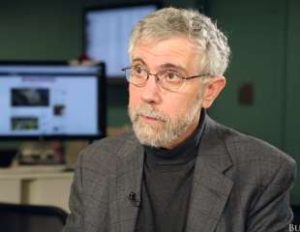Paul Krugman: China’s Leaders Have No Idea What They Are Doing
Janet Allon
Paul Krugman turns his attention to China in his New York Times column of 31 July [1], and determines that despite Donald Trump’s assertion that China is “eating our lunch,” the country’s leaders have no idea what they are doing.
Politicians who happen to preside over booms (Jeb Bush) tend to take credit for those booms, Krugman points out. China is no exception.
“This is the context in which you need to understand the strange goings-on in China’s stock market,” he writes. “In and of itself, the price of Chinese equities shouldn’t matter all that much. But the authorities have chosen to put their credibility on the line by trying to control that market — and are in the process of demonstrating that, China’s remarkable success over the past 25 years notwithstanding, the nation’s rulers have no idea what they’re doing.”

What China is wrestling with is managing a period when growth must necessarily slow. Not easy, of course, because, per Krugman:
“China’s economic structure is built around the presumption of very rapid growth. Enterprises, many of them state-owned, hoard their earnings rather than return them to the public, which has stunted family incomes; at the same time, individual savings are high, in part because the social safety net is weak, so families accumulate cash just in case. As a result, Chinese spending is lopsided, with very high rates of investment but a very low share of consumer demand in gross domestic product.
“This structure was workable as long as torrid economic growth offered sufficient investment opportunities. But now investment is running into rapidly decreasing returns. The result is a nasty transition problem: What happens if investment drops off but consumption doesn’t rise fast enough to fill the gap?
“What China needs are reforms that spread the purchasing power — and it has, to be fair, been making efforts in that direction. But by all accounts these efforts have fallen short. For example, it has introduced what is supposed to be a national health care system, but in practice many workers fall through the cracks.
“Meanwhile, China’s leaders appear to be terrified — probably for political reasons — by the prospect of even a brief recession. So they’ve been pumping up demand by, in effect, force- feeding the system with credit, including fostering a stock market boom. Such measures can work for a while, and all might have been well if the big reforms were moving fast enough. But they aren’t, and the result is a bubble that wants to burst. ”
The response has been an “an all-out effort to prop up stock prices,” Krugman continues, which might be a good strategy for a couple of days, but not something to be sustained. Here is the irony: “It also looks as if the Chinese government, having encouraged its citizens to buy stocks, now feels that it must defend stock prices to preserve its reputation. And what it’s ending up doing, of course, is shredding that reputation at record speed.”
Leadership is something that seems in short supply. And it is always ordinary people who pay the price.
Source: Alternet, 31 July, 2015 http://www.alternet.org/economy/paul-krugman-chinas-leaders-have-no-idea-what-they-are-doing
Reference:
1. http://www.nytimes.com/2015/07/31/opinion/paul-krugman-chinas-naked-emperors.html
 Janet Allon is an author and a seasoned journalist . She studied 20th-century American literature at Wesleyan University, and has a Masters degree in journalism from Columbia University.
Janet Allon is an author and a seasoned journalist . She studied 20th-century American literature at Wesleyan University, and has a Masters degree in journalism from Columbia University.






























